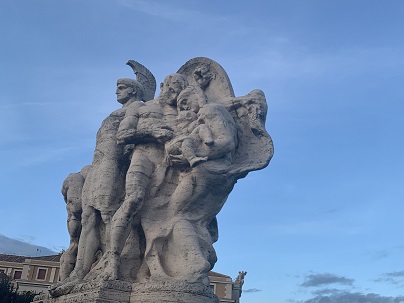Intersections consists of updates of our research & travels related to comparative laws across various countries. Our goal is to learn and help apply what we learn to improve our communities. Broadly speaking, law helps us create harmony and order in our societies, similar to languages. Languages have rules, such as spelling and grammer, to help us communicate. And religion plays a role in both areas. All intersect to help build and maintain our societies.
Posts and Titles by Date
Jan. 02, 2023 -- Gender in Language
Dec. 27, 2022 -- Comparative Property Rights
Dec. 18, 2022 -- Comparative Political Structures
Dec. 12, 2022 -- Immigration and Citizenship
Dec. 10, 2022 -- Examples of Intersections between Law & Religion
---
Gender in Language -- Jan. 2, 2023
Some languages assign gender to most nouns… objects, living things, countries... For example, in Italian, a table is masculine, while the chair is feminine; a mountain is feminine while a sea is masculine; a fruit is feminine, while the tree is masculine. This was not the case with Latin as the root language; rather, people from the north, Germanic and Gauls, brought these concepts to the Roman empire roughly around the fourth and fifth centuries and created a mixed language.
This differentiation is significant it implies certain perspective and approach to how people lived and collaborated with their surroundings. Perhaps the tree is masculine because it “creates” and is a source for the fruit, while the fruit supports and nurtures living beings.
It is unclear, however, how this differentiation plays into laws and legal systems. Such a study would require deeper study and scrutiny into comparative laws. At the minimum the perspective likely originated from an understanding or philosophy, where such a philosophy likely affected the evolution of governing and legal systems.
In other countries, it is the state, not the municipality, that imposes and receives taxes. Also, in other countries, protection is not strong, such that disputes would have to be resolved by the involved individuals, and disputes against state takeover are too difficult to win.
Back to posting list
Comparative Property Rights -- Dec. 27, 2022

There are many arguments involving owning land. Some questions and debates are about whether land can be owned in the first place; if so, how would ownership be administered, what rights would ‘ownership’ include, how would those rights be protected, and what government entity would be entitled to taxes.
Of course different countries and systems approach these questions differently. Some might decide that there cannot be ownership and only the state can administer land use. On the other end, some have registration and index systems to maintain chains of ownership, and to protect rights of excluding others from entering or disputing ownership.
In the United States, ownership is generally administered by municipalities, such as cities and counties. Those municipalities impose taxes, allow for tenancies (rentals), and along with local and national laws also provide some protection and methods for dispute resolutions, including against state takeover.
In other countries, it is the state, not the municipality, that imposes and receives taxes. Also, in other countries, protection is not strong, such that disputes would have to be resolved by the involved individuals, and disputes against state takeover are too difficult to win.
Back to posting list
Comparative Political Structures -- Dec. 18, 2022
In creating countries, or sovereigns, there are generally two opposing forces. One looking to be part of a bigger structure that in turn would have to give up some autonomy; while the second seeks to retain autonomy.
In the United States, the system has the label of federalism. How much power the states retained was a major part of the discussion and negotiations between the founding figures and members. For example, the First Amendment, seeking to ensure freedom of speech, religion, and assembly, was in large part to appease the states that sought to retain autonomy and to prevent the central government from gaining too much power over the people. The Tenth Amendment states that those powers not delegated to the States… are reserved to the States.
For comparison purposes. Italy is one country that has in some ways a similar structure, albeit not called federalism. For example, Italy has twenty regions that retained some autonomy. The regions have legislative powers with matters not expressly reserved to the state. Some powers expressly reserved to the state include immigration and asylum, defense and armed forces, and relations with the European Union. A few of the regions have more autonomy than others; this was in part to help keep these regions part of Italy and avoid secession.
Back to posting list
Immigration and Citizenship -- Dec. 12, 2022

Immigration is a hot topic for many countries. Some are overwhelmed by a persistent influx due to extremely unfavorable conditions elsewhere; others face spikes during conflicts in surrounding regions. Some of the issues receiving countries grapple with include maintaining the country’s identity, language, costs that arise due to welfare of the incoming population language, healthcare.
It is not a simple issue. Granting immigrants citizenship extends these concerns long-term, in particular affecting the country’s identity. Citizenship is, in a way, a membership. Granting membership will invariably alter that identity. One out of a million would not cause a dent, but a hundred thousand becomes noticeable.
For many countries, identity and heritage are crucial, so much so that they simply make it too difficult for new comers to gain citizenship. For those more accepting, language usually plays a big part. That is, not speaking the language conflicts with the idea of membership. Then, for some of these more open countries, religion is also a big part of that identity, and membership, even where there is some claim to separation of church and state.
The solution often lies in management – assisting countries of origin to help prevent an exodus, contributing to long-term environmental goals such that countries do not face extreme weather conditions that cause an exodus; assimilation programs that emphasize language education. Of course it is easier said than done; however, the solution is in planning and organizing, and not in extremes of completely rejecting safe havens for other humans, nor in completely being open and drastically and rapidly altering the country’s identity.
Back to posting list
Examples of Intersections between Law & Religion -- Dec. 10, 2022
Today, it is advisable that we separate church from state. One important reason for this is that we have many religions within most countries across the globe; thus, separating church from state helps us strive for equality and avoid persection. Nonetheless, looking at history, religion has played a role in devising our laws. Murder, for example - 'thou shall not...' Even equality is based on religious guidance.
Back to posting list
